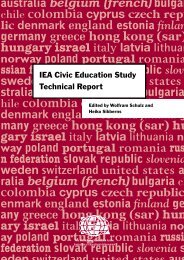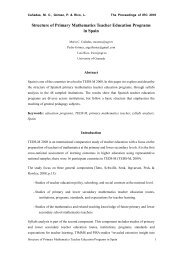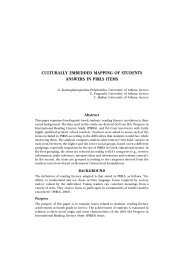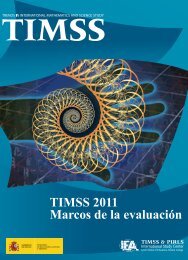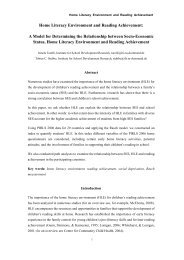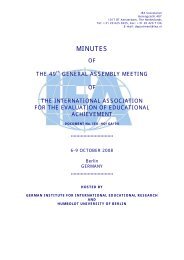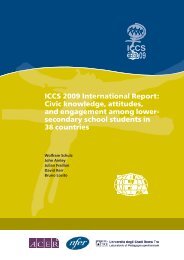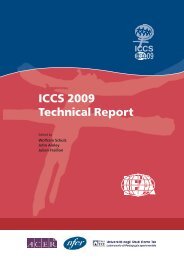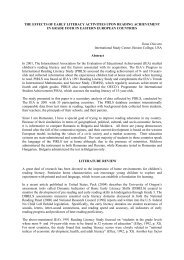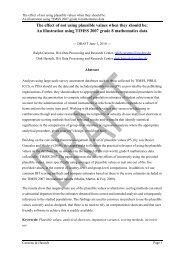Teacher Education and Development Study in Mathematics - IEA
Teacher Education and Development Study in Mathematics - IEA
Teacher Education and Development Study in Mathematics - IEA
You also want an ePaper? Increase the reach of your titles
YUMPU automatically turns print PDFs into web optimized ePapers that Google loves.
PART 2: UNITED KINGDOM<br />
167<br />
<strong>Teacher</strong> salaries<br />
In both Engl<strong>and</strong> <strong>and</strong> Scotl<strong>and</strong>, teachers earn similar salaries regardless of the level they<br />
teach. For example, a primary teacher <strong>in</strong> Scotl<strong>and</strong> who has reached the top of the salary<br />
scale <strong>in</strong> terms of experience but with m<strong>in</strong>imum teacher education earned $48,205<br />
($PPP) <strong>in</strong> 2005, identical to salaries earned by similar teachers <strong>in</strong> lower- <strong>and</strong> uppersecondary<br />
schools. In Engl<strong>and</strong>, the correspond<strong>in</strong>g salary was $43,835 (OECD, 2007).<br />
The difference between teachers at the top of the salary scale <strong>and</strong> those at the bottom<br />
is lower than the average ratio <strong>in</strong> OECD countries. While top-salary lower-secondary<br />
teachers <strong>in</strong> OECD countries earn on average 1.71 times the remuneration of the lowestearn<strong>in</strong>g<br />
teachers, the ratio between top <strong>and</strong> bottom is 1.55 times <strong>in</strong> Engl<strong>and</strong> <strong>and</strong> 1.46<br />
times <strong>in</strong> Scotl<strong>and</strong> (OECD, 2004).<br />
In terms of annual salaries, secondary teachers <strong>in</strong> Scotl<strong>and</strong> with 15 years of experience <strong>and</strong><br />
m<strong>in</strong>imum teacher education ranked fifth among OECD countries <strong>in</strong> 2005. Their annual<br />
salary at the time was $48,205, aga<strong>in</strong> calculated accord<strong>in</strong>g to PPP. <strong>Teacher</strong>s <strong>in</strong> Engl<strong>and</strong><br />
earned $48,435, plac<strong>in</strong>g them eighth among OECD countries. In terms of the ratio of<br />
salaries to GDP per capita, teachers <strong>in</strong> Scotl<strong>and</strong> earn 1.47 times GDP per capita while<br />
teachers <strong>in</strong> Engl<strong>and</strong> earn 1.33 times GDP per capita, plac<strong>in</strong>g both countries above the<br />
OECD mean of 1.30 times GDP per capita. In PPP terms, beg<strong>in</strong>n<strong>in</strong>g teachers <strong>in</strong> Scotl<strong>and</strong><br />
with m<strong>in</strong>imum teacher education earned more ($30,213) than new teachers <strong>in</strong> Engl<strong>and</strong><br />
($29,992) <strong>in</strong> 2005. <strong>Teacher</strong>s <strong>in</strong> both countries earned slightly more than the mean of<br />
beg<strong>in</strong>n<strong>in</strong>g teachers <strong>in</strong> OECD countries, which was $29,772 <strong>in</strong> 2005 (OECD, 2007).<br />
Between 1996 <strong>and</strong> 2002, the numerical value of salaries for beg<strong>in</strong>n<strong>in</strong>g teachers <strong>in</strong>creased<br />
by more than the mid-career <strong>and</strong> the top-of-the-scale salaries <strong>in</strong> both Engl<strong>and</strong> <strong>and</strong><br />
Scotl<strong>and</strong>, <strong>in</strong>dicat<strong>in</strong>g the desire of these countries to attract younger teachers to the<br />
profession. For example, <strong>in</strong> Scotl<strong>and</strong>, salaries for beg<strong>in</strong>n<strong>in</strong>g teachers <strong>in</strong>creased by 21%<br />
dur<strong>in</strong>g this period, while salaries for teachers at the top of the salary scale <strong>in</strong>creased<br />
by only 6% (OECD, 2004). Engl<strong>and</strong> cont<strong>in</strong>ued this policy direction between 2002 <strong>and</strong><br />
2005, <strong>in</strong>creas<strong>in</strong>g start<strong>in</strong>g salaries by 18% <strong>and</strong> top-of-the-scale salaries by only 11%.<br />
Scotl<strong>and</strong> reversed its salary policy direction, rais<strong>in</strong>g high-end salaries by 19% <strong>and</strong><br />
start<strong>in</strong>g salaries by only 11% (OECD, 2007).<br />
<strong>Teacher</strong>s’ comparative salaries<br />
The start<strong>in</strong>g salary for teachers <strong>in</strong> Engl<strong>and</strong> <strong>and</strong> Wales <strong>in</strong> 2003 was £17,595, lower than<br />
the average graduate’s start<strong>in</strong>g salary of £19,714. In Scotl<strong>and</strong>, the start<strong>in</strong>g salary for a<br />
teacher who had completed his or her probation year was £21,588. <strong>Teacher</strong>s’ start<strong>in</strong>g<br />
salaries were higher than those of other public-sector workers, such as social workers,<br />
but lower than those of police officers, who earned on average £19,842. There is also<br />
evidence that teachers’ salaries have fallen beh<strong>in</strong>d the salaries of other college graduates<br />
over time. Estimates based on data from the Labour Force Survey <strong>in</strong>dicate that while<br />
teachers under 25 years of age earn just below the average salary of all graduates, teachers<br />
25 to 29 years of age earn 86% of the average graduate salary <strong>and</strong> teachers 30 to 39 years<br />
of age earn 80% of the average salary of all graduates. However, a revision of teachers’<br />
pay scales <strong>in</strong> Engl<strong>and</strong>, Wales, <strong>and</strong> Northern Irel<strong>and</strong> <strong>in</strong> 2002 has allowed teachers to reach<br />
the top of the pay scale <strong>in</strong> five years, after which they can move on to a higher scale. This<br />
ability to <strong>in</strong>crease salary rapidly with<strong>in</strong> the first five years compares favorably with the<br />
situation for workers <strong>in</strong> other public-sector jobs, who generally cannot <strong>in</strong>crease their<br />
salaries as rapidly (Ross & Hutch<strong>in</strong>gs, 2003).



